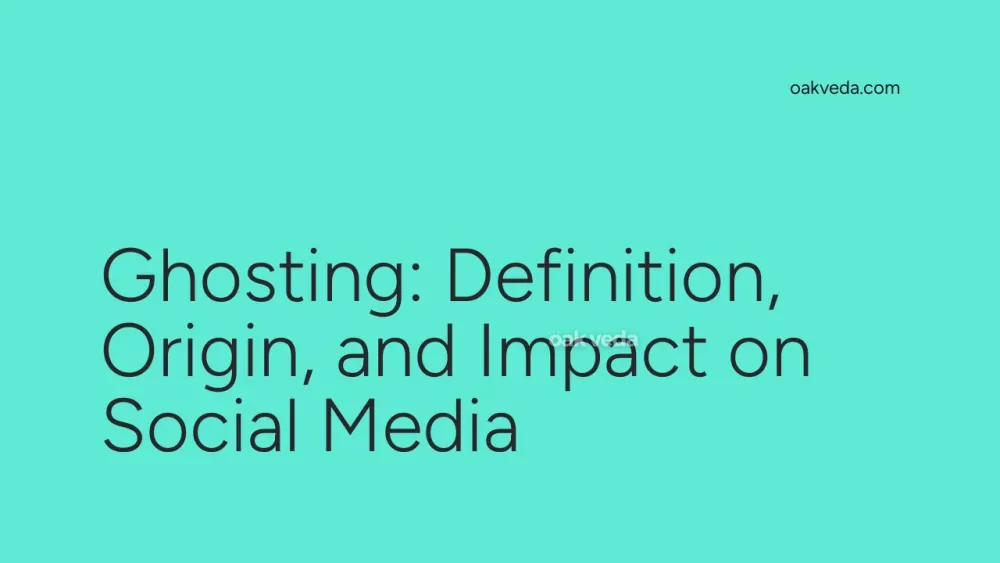
What is Ghosting?
Ghosting is a modern social phenomenon where someone abruptly cuts off all communication with another person without explanation. In the context of social media and digital relationships, ghosting occurs when an individual suddenly stops responding to messages, calls, or any form of online interaction, essentially "disappearing" from the other person's digital life.
Origin and Development of Ghosting
The term "ghosting" gained popularity in the early 2010s, coinciding with the rise of online dating platforms and social media apps. While the act of cutting off communication has existed for much longer, the digital age has made it easier for people to disconnect without facing immediate consequences.
The New York Times popularized the term in 2015, and it has since become a widely recognized concept in modern dating and social interactions. As social media platforms evolved and became more integrated into daily life, ghosting expanded beyond romantic relationships to include friendships and professional connections.
How Ghosting Works
Ghosting typically follows a pattern:
- Regular communication: Two individuals engage in consistent interaction.
- Sudden silence: One person abruptly stops responding without warning.
- No explanation: The "ghoster" provides no reason for their disappearance.
- Confusion and uncertainty: The "ghosted" person is left wondering what happened.
In the social media context, ghosting might involve:
- Ignoring direct messages
- Not responding to comments or tags
- Unfollowing or blocking without explanation
- Disappearing from shared group chats
Types of Ghosting
While ghosting is often associated with romantic relationships, it can occur in various social contexts:
- Dating ghosting: Abruptly ending communication with a romantic interest
- Friendship ghosting: Cutting off contact with a friend
- Professional ghosting: Suddenly ceasing communication in a work-related context
- Family ghosting: Disconnecting from family members
- Social media ghosting: Specifically related to online platforms and digital communication
Impact of Ghosting on Social Media Culture
Ghosting has significantly influenced social media culture and online behavior:
- Emotional impact: It can lead to feelings of rejection, confusion, and lowered self-esteem for those who are ghosted.
- Trust issues: Frequent experiences with ghosting may cause individuals to be more guarded in online interactions.
- Communication norms: Ghosting has become an unfortunate expectation in digital relationships, altering how people approach online connections.
- Mental health concerns: The uncertainty and lack of closure associated with ghosting can contribute to anxiety and depression.
- Conflict avoidance: Some individuals use ghosting as a way to avoid confrontation or difficult conversations.
Controversies and Debates Surrounding Ghosting
The practice of ghosting has sparked numerous debates:
- Ethics of ghosting: Many argue that ghosting is inherently disrespectful and harmful.
- Generational divide: Some view ghosting as a millennial and Gen Z phenomenon, while others argue it's a universal behavior.
- Cultural differences: Perceptions of ghosting vary across different cultures and social norms.
- Safety concerns: In some cases, ghosting may be a necessary safety measure to avoid harassment or abuse.
How Brands and Influencers Address Ghosting
Brands and influencers have recognized the prevalence of ghosting and its impact on their audiences:
- Content creation: Many create relatable content about ghosting experiences to engage followers.
- Mental health awareness: Some use their platforms to discuss the psychological effects of ghosting.
- Dating apps: Several dating platforms have implemented features to reduce ghosting, such as reminders to respond to messages.
- Customer service: Brands are increasingly aware of "corporate ghosting" and strive to maintain consistent communication with customers.
Future Trends Related to Ghosting
As digital communication continues to evolve, several trends related to ghosting are emerging:
- AI-powered communication: Chatbots and AI assistants may help manage expectations and reduce perceived ghosting in customer service.
- Digital etiquette education: There's a growing emphasis on teaching proper online communication skills, including how to end relationships respectfully.
- Anti-ghosting features: Social media platforms may introduce features to encourage consistent communication and discourage abrupt disconnections.
- Psychological research: Increased studies on the long-term effects of ghosting on mental health and social behavior.
FAQs about Ghosting
Q: Is ghosting always intentional? A: Not necessarily. Sometimes, people may unintentionally ghost due to personal circumstances, mental health issues, or simple forgetfulness.
Q: How can I avoid being ghosted? A: While you can't control others' actions, maintaining open communication and setting clear expectations in relationships can help reduce the likelihood of ghosting.
Q: Is it ever okay to ghost someone? A: While generally discouraged, ghosting may be acceptable in situations involving harassment, abuse, or when personal safety is at risk.
Q: How can I recover from being ghosted? A: Focus on self-care, reach out to supportive friends or family, and remember that the other person's actions reflect on them, not you.
Q: Has ghosting increased with the rise of social media? A: While the act of cutting off communication isn't new, social media and digital platforms have made ghosting more prevalent and noticeable.
In conclusion, ghosting has become a significant aspect of modern social media culture, affecting how people interact and form relationships online. As digital communication continues to evolve, it's crucial to be aware of the impact of ghosting and strive for more respectful and open online interactions.
You may be interested in:
- DC (Dance Credit) on TikTok: Definition, Origin, and Impact
- Chronically Online: Definition, Origin, and Impact
- Fandom: Definition, Origin, and Impact on Social Media
- Social Media Bio: Definition, Origin, and Impact
- NPS (Net Promoter Score): Definition, Origin, and Impact
- Stan Store: Definition, Origin, and Impact on Creator Economy

